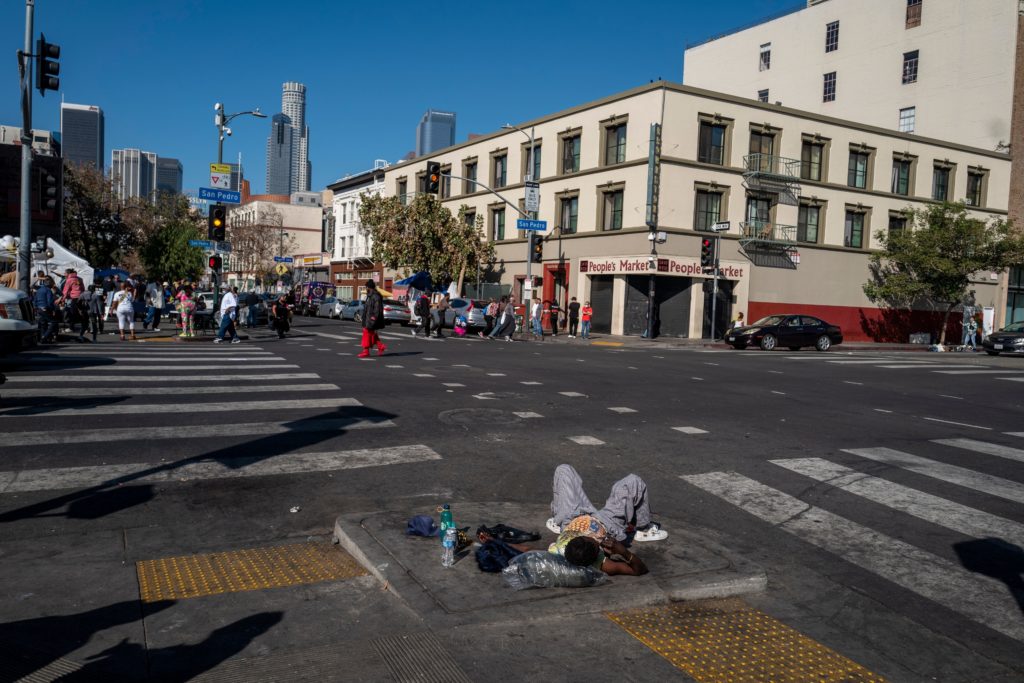I see her when I drive into the underground parking lot of the homeless shelter where I earn my daily bread.
I see a lot of things on my commute and very few of them are good. When I drive the streets of Skid Row, human degradation at its zenith — or is it at its nadir? — is on full display. It is difficult to process knowing I live in the most prosperous and wealthy nation in human history, and see misery on a daily basis in a city where people drop $100 on a salad at tony restaurants.
She is like so many of the other people I have seen on Skid Row in downtown LA, and yet she is different. Men and women in a drug-induced psychosis screaming in the middle of the street, or wearing layers of caked dirt with tattered fabric hanging on open sores, is business as usual down there.
Her clothes are not clean, but by Skid Row standards this woman is well-kept. She sits in one of those half chair/half walkers that people with mobility issues rely on. I have never seen her use it to assist in walking. I have only seen her sitting on the device with her back hunched over and her eyes looking up at her surroundings.
On Skid Row, keeping one’s head on a swivel is an essential element of survival. It is a violent place. It is a parallel universe with its own rules and regulations as structured and absolute as the law of gravity. It is an environment where only the bravest can survive.
She looks like somebody’s grandma. Odds are, she is somebody’s grandma. She was once somebody’s pride and joy, a bundle of innocence wrapped in swaddling clothes. I have no idea how, at her advanced age, she came to sit outside a homeless shelter in Los Angeles.
The irony is not lost on me that she will not enter that very shelter where services abound, and where a safe place to sleep and assistance with reconnecting to her family is offered to all comers. To the best of my knowledge, other than availing herself of the food we provide, she has never stepped inside.
She always waves at me and smiles, whether I am going into or coming out of the parking lot. I smile and wave back, and that is all I do. I reason that by working at this shelter raising money to fund programs and keep the lights on, I am doing my bit to help. That is the nature of this business. The beds are here, the help is at hand, but the people those beds and services are meant for must, in the end, walk themselves through the door to access them.
There is another demographic on Skid Row that is rarely highlighted in news reports or feature articles. There are families down here and they are not homeless. They live in the dingy and ill-kept apartments and hotels surrounding Skid Row. They are the working poor, immigrants and nonimmigrants alike with the common denominator of poverty.
I see these moms and dads escorting their children through the brutal streets of Skid Row in the morning on their way to school. The children, with their Incredible Hulk and Barbie backpacks, could be walking to school to any suburban LA parochial school … only they are walking through a forest of human suffering.
The moms and dads keep a firm hand on their kids as they walk with eyes forward and at a steady clip to get through the Skid Row gauntlet as quickly as possible.
Just the other day, I waited to enter the shelter parking lot as a couple of moms with backpack-laden kids walked by. The old grandma was in her usual spot. She waved at me, and I waved back. Suddenly, one of the escorted kids, a girl of about 10, broke from her mother’s grasp. There was a look of serious anxiety on the mom’s face as this girl approached the old lady on the side of the parking structure and gave her the blended fruit smoothie she was drinking. The old lady bowed her head in thanks. The little girl returned to her mom, and off to school they went.
Burning bushes and heavenly voices from above the River Jordan are certainly profound examples of divine communication. But the world has been and continues to be full of ways God tries to get our attention not found within the covers of a Bible. That simple act of kindness and recognition that this poor — yes, poor — girl gave to someone in greater need than herself was certainly God trying to get my attention.
In the greater scope of things, that fruit smoothie was not going to put a dent in LA’s homeless emergency. But it made all the difference to that woman sitting next to the entrance of a homeless shelter that day.

